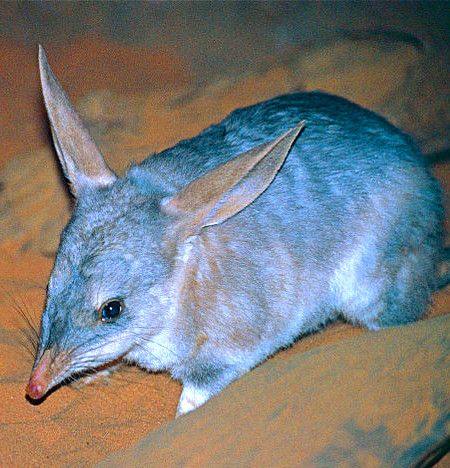Bilbies evolve dog response
 Research suggests bilbies are hard-wired to avoid dogs as a result of co-evolution with dingoes.
Research suggests bilbies are hard-wired to avoid dogs as a result of co-evolution with dingoes.
A new study has found wild bilbies are more reluctant to leave their burrows when dog faeces has been placed nearby than when they are presented with the faeces of feral cats, which are major introduced predators of the small native Australian marsupials.
The UNSW research team studied bilbies which had never been exposed to dogs or other introduced predators.
The bilbies live in the Arid Recovery Reserve in South Australia – a large fenced area which has been free of dingoes, dogs, cats, foxes and rabbits for the past 16 years.
“Our results suggest that dingoes should now be regarded as a native species, because of this innate ability of native prey to recognise dogs as threats,” says study senior author, UNSW Associate Professor Mike Letnic.
“The study supports the ghosts of predators past hypothesis, that a prey’s ability to respond to the odours and images of predators increases with the length of time they have co-existed.
“Bilbies have shared more than 3,000 years of evolutionary history with dingoes and dogs, but less than 200 years with cats, which appears to be long enough for them to recognise dog scent.”
The researchers attached tracking devices to 18 wild bilbies and set up cameras near the entrance to their burrows.
When dog faeces was placed nearby, the bilbies spent much more time partially emerged from their burrows, with just their heads and shoulders sticking out, than when they could smell the faeces of deadly cats or harmless rabbits nearby.
Dog faeces was used for the experiment, rather than dingo faeces, because they are chemically indistinguishable.
“Working out how naïve native prey respond to threats is important for understanding why native mammals numbers have declined and why some attempts to reintroduce locally extinct animals have failed,” says Ms Steindler
“Since European settlement the distribution of bilbies has decreased dramatically, with them now occupying just 20 per cent of their former range.”







 Print
Print